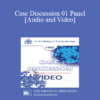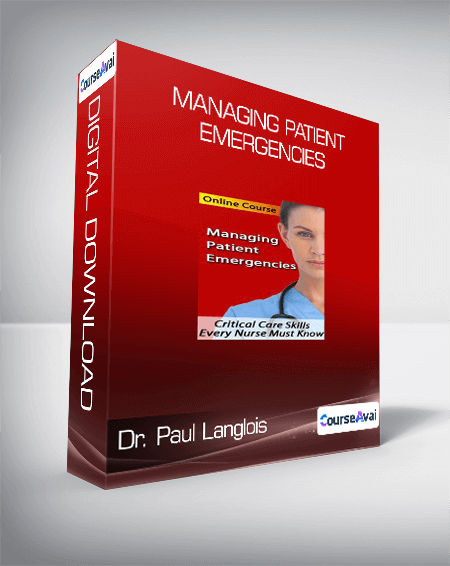$199.00 Original price was: $199.00.$58.00Current price is: $58.00.
Imagine this… You have a 66 year old patient with type 2 diabetes receiving a high dose of steroids that is having problems breathing. They have a fever of 100.9, blood pressure is 90/60 supine – Plus, their white blood cell count is 12,000. They are also receiving a potassium rider and almost all of their labs are out of control. Which issue should you address first?
 Purchase this course you will earn 58 Points worth of $5.80
Purchase this course you will earn 58 Points worth of $5.80Elevate your skills with the Dr. Paul Langlois – Managing Patient Emergencies course, available for just $199.00 Original price was: $199.00.$58.00Current price is: $58.00. on Utralist.com! Browse our curated selection of over 60,000 downloadable digital courses across diverse Health and Medical. Benefit from expert-led, self-paced instruction and save over 80%. Start learning smarter today!
Imagine this… You have a 66 year old patient with type 2 diabetes receiving a high dose of steroids that is having problems breathing. They have a fever of 100.9, blood pressure is 90/60 supine – Plus, their white blood cell count is 12,000. They are also receiving a potassium rider and almost all of their labs are out of control. Which issue should you address first?
Purchase Dr. Paul Langlois – Managing Patient Emergencies courses at here with PRICE $199 $58
Dr. Paul Langlois – Managing Patient Emergencies
Imagine this… You have a 66 year old patient with type 2 diabetes receiving a high dose of steroids that is having problems breathing. They have a fever of 100.9, blood pressure is 90/60 supine – Plus, their white blood cell count is 12,000. They are also receiving a potassium rider and almost all of their labs are out of control. Which issue should you address first?
Split second decisions like this are stressful and with the number of patients you care for daily that require much more attention than your schedule allows for, how can you possibly do it all… You NEED to be able to rapidly assess and implement appropriate interventions to give your patients the best opportunities for recovery.
With over 30 years of experience managing patients with life-threatening diseases, Dr. Paul Langlois will guide you step by step through symptoms, tests that will verify a diagnosis, and treatment options for various body systems including:
- Cardiovascular
- Respiratory
- Endocrine
- Gastrointestinal
- Neurological
- Renal
Leave this online course with sharpened skills and be prepared to identify and manage your next patient emergency without hesitation!
Module 1
- Identifying red flags
- Initial steps to take in a patient emergency
- Rapid assessment techniques you can use immediately
Module 2
- Components of an ECG
- Symptoms and treatment of metabolic acidosis & alkalosis
- Treating respiratory acidosis & alkalosis
- Identifying cardiac complications using an ECG
Module 3
- Case study to strengthen cardiac learnings
- What happens when you take morphine, aspirin or nitroglycerine for cardiac conditions
- Assessment strategies for the heart
- Exams to reveal pericarditis and cardiac tamponade
Module 4
- Symptoms and treatment of Aortic dissection
- Case studies with x-rays
- Classifications and stages of heart failure
Module 5
- Interventions for various cardiac conditions
- Preparation and criteria for intubation
- Management strategies for DKA
- Causes, symptoms and consequences of pancreatitis
- Strategies to stop upper & lower GI bleeds
- What Diverticulosis and Diverticulitis look like and how to manage it
Module 7
- Traumatic brain injuries and their implications
- Treatment of elevated ICP
- How to avoid EVD complications
Module 8
- Diagnosis and treatment of ischemic and hemorrhagic stroke
- Ischemic stroke treatment for patients beyond the 4.5-hour window for TPA
- Intracerebral hemorrhage guidelines
Module 9
- Classifications/stages of acute kidney injury
- How to manage pain using opioids, nonopioids muscle relaxers and more
- FDA statements about heart attack and stroke
Module 10
- Agitation management strategies
- How to prevent delirium
- Case studies to apply what you have learned
Would you like to receive Dr. Paul Langlois – Managing Patient Emergencies ?
Dr. Paul Langlois, APN, PhD, CCRN, CCNS, CNRN, is a critical care clinical specialist in the Surgical, Medical, Neuro, CCU and Trauma ICUs of Cook County Hospital, Chicago. Drawing on over 30 years of experience assessing and managing patients with life-threatening diseases, Dr. Langlois provides advanced-level training to nurses, physician assistants, nurse practitioners and physicians.Dr. Langlois is committed to providing the highest quality of care to patients through advanced education. His presentations are evidence-based, timely and provide participants with case studies to facilitate critical thinking. As a bedside clinical nurse specialist, Dr. Langlois has developed several critical care and infection control institution-wide protocols for the multidisciplinary assessment and management of the cardiac and septic patient. Dr. Langlois’ cardiac protocols include: weaning from mechanical ventilation, pulmonary artery catheter and hemodynamic monitoring, vasoactive medications, ventricular assist devices, renal replacement therapy, and neurologic alterations after trauma. His infection control guidelines include: minimizing the use of antibiotics to reduce resistant strains of bacteria, antibiotic treatment protocols for patients with central line infections, methods to reduce catheter associated urinary tract infections and methods to minimize the spread of infectious organisms between patients and among caregivers.
Interact and collaborate with other professionals in the online community through chat boards and online forums. Participants love sharing ideas, asking questions and networking with peers!
Complete your CE tests online at the completion of each module, with instant access to your CE certificates – earn up to 12.6 CE hours.
Get Dr. Paul Langlois – Managing Patient Emergencies download
Purchase Dr. Paul Langlois – Managing Patient Emergencies courses at here with PRICE $199 $58
Cultivate continuous growth with the Dr. Paul Langlois – Managing Patient Emergencies course at Utralist.com! Unlock lifetime access to premium digital content, meticulously designed for both career advancement and personal enrichment.
- Lifetime Access: Enjoy limitless access to your purchased courses.
- Exceptional Value: Benefit from savings up to 80% on high-quality courses.
- Secure Transactions: Your payments are always safe and protected.
- Practical Application: Gain real-world skills applicable to your goals.
- Instant Accessibility: Begin your learning journey immediately after buying.
- Device Compatible: Access your courses seamlessly on any device.
Transform your potential with Utralist.com!
Related products
Health and Medical
= 28 Points
Health and Medical
= 43 Points
Health and Medical
= 74 Points
Health and Medical
= 53 Points
Health and Medical
= 33 Points
Health and Medical
CDT Dental Coding and Reimbursement Update: Identifying Common Practice Mistakes – Paul Bornstein
= 85 Points
Health and Medical
Certificate Course in Optimal Aging: Evidence-Based Interventions for Older Adults – Carole Lewis
= 95 Points











